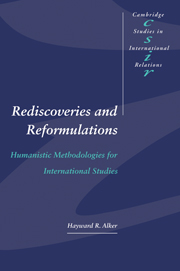Book contents
- Frontmatter
- Contents
- List of figures
- List of tables
- Acknowledgments
- Introduction: Voyages of rediscovery
- Part I Recovering Western antiquity
- Part II The humanistic science of the modern classics
- Part III Contemporary humanistic reformulations
- 8 Fairy tales, tragedies and world histories: Testable structuralist interpretations
- 9 Beneath Tit-for-Tat: The contest of political economy fairy tales within SPD protocols
- 10 Emancipatory empiricism: Toward the renewal of empirical peace research
- 11 The presumption of anarchy in world politics: On recovering the historicity of world society
- 12 The return of practical reason to international theory
- References
- Index
- CAMBRIDGE STUDIES IN INTERNATIONAL RELATIONS
8 - Fairy tales, tragedies and world histories: Testable structuralist interpretations
Published online by Cambridge University Press: 13 January 2010
- Frontmatter
- Contents
- List of figures
- List of tables
- Acknowledgments
- Introduction: Voyages of rediscovery
- Part I Recovering Western antiquity
- Part II The humanistic science of the modern classics
- Part III Contemporary humanistic reformulations
- 8 Fairy tales, tragedies and world histories: Testable structuralist interpretations
- 9 Beneath Tit-for-Tat: The contest of political economy fairy tales within SPD protocols
- 10 Emancipatory empiricism: Toward the renewal of empirical peace research
- 11 The presumption of anarchy in world politics: On recovering the historicity of world society
- 12 The return of practical reason to international theory
- References
- Index
- CAMBRIDGE STUDIES IN INTERNATIONAL RELATIONS
Summary
A fairy tale fulfills the role of a social utopia.
Roman Jakobson (1973)But like any living thing, the tale can generate only forms that resemble itself. If any cell of a tale organism becomes a small tale within a larger one, it is built … according to the same rules as any fairy tale.
V. Propp (1977)Essence is expressed by grammar.
Ludwig Wittgenstein (in Gier 1981)Troubled times breed reflective thinkers. As inhabitants of such an era we join those from other ages, other disciplines and even other civilizations in the search for historical understanding. We try to make sense of the world we live in, in order to distinguish what we can change and what we cannot, to illuminate the choices we may make, to inspire informed hope and counsel reasoned caution in our descendants, giving dignity to our own brief lives, our contemporaries and those before and after us.
As a teacher of an historically oriented interdisciplinary course on theories of international relations, I am struck both by the centrality of these purposes in the literature I have recently assigned to my students, and the unsatisfactory nature of the interpretive accounts they provide. Among scholarly studies of our multifaceted predicament written in the last decade or so, perhaps the most attention catching have been:
~~(a) the global modeling studies evoked by the Club of Rome's amplification of debates occasioned by Jay Forrester's World Dynamics; and
~~(b) the Annales style of modern world systems studies stimulated by Fernand Braudel's exemplary writings, starting with La Méditerranée à l'poque de Philippe II.
- Type
- Chapter
- Information
- Rediscoveries and ReformulationsHumanistic Methodologies for International Studies, pp. 267 - 302Publisher: Cambridge University PressPrint publication year: 1996



